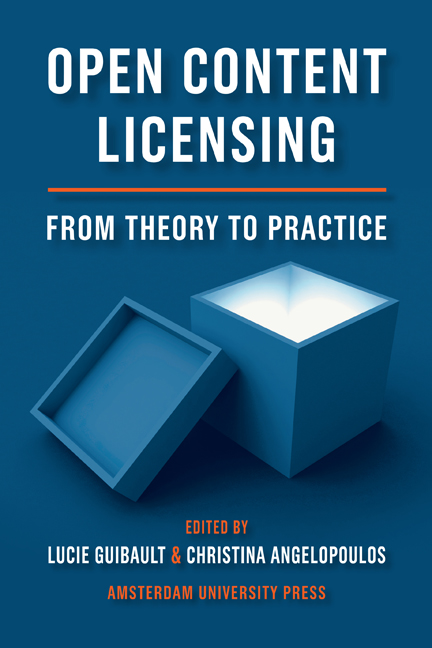Book contents
- Frontmatter
- Contents
- 1 Open Content Licensing: From Theory to Practice – An Introduction
- 2 Towards a New Social Contract: Free-Licensing into the Knowledge Commons
- 3 Is Open Content a Victim of its Own Success? Some Economic Thoughts on the Standardization of Licenses
- 4 (Re)introducing Formalities in Copyright as a Strategy for the Public Domain
- 5 User-Related Assets and Drawbacks of Open Content Licensing
- 6 Owning the Right to Open Up Access to Scientific Publications
- 7 Friends or Foes? Creative Commons, Freedom of Information Law and the European Union Framework for Reuse of Public Sector Information
- 8 Contributing to Conversational Copyright: Creative Commons Licenses and Cultural Heritage Institutions
- 9 Creative Commons and Related Rights in Sound Recordings: Are the Two Systems Compatible?
1 - Open Content Licensing: From Theory to Practice – An Introduction
Published online by Cambridge University Press: 22 January 2021
- Frontmatter
- Contents
- 1 Open Content Licensing: From Theory to Practice – An Introduction
- 2 Towards a New Social Contract: Free-Licensing into the Knowledge Commons
- 3 Is Open Content a Victim of its Own Success? Some Economic Thoughts on the Standardization of Licenses
- 4 (Re)introducing Formalities in Copyright as a Strategy for the Public Domain
- 5 User-Related Assets and Drawbacks of Open Content Licensing
- 6 Owning the Right to Open Up Access to Scientific Publications
- 7 Friends or Foes? Creative Commons, Freedom of Information Law and the European Union Framework for Reuse of Public Sector Information
- 8 Contributing to Conversational Copyright: Creative Commons Licenses and Cultural Heritage Institutions
- 9 Creative Commons and Related Rights in Sound Recordings: Are the Two Systems Compatible?
Summary
Sharing and Remixing
The internet has drastically changed the legal, economic and social realities of accessing and using knowledge and culture. For the first time in history, the internet provides a single infrastructure allowing the citizens of the world universal access to potentially unlimited sources of knowledge and expressions of culture. In addition, digital technology is modifying the production and distribution patterns of copyrighted works, as well as consumer habits. Users are adopting a more active role towards copyrighted material: not only can they easily reproduce works in countless perfect copies and communicate them to thousands of other users, but they can also manipulate works to create entirely new products. Similarly, the distribution of works is simpler in the digital networked environment and, instead of going through complex distribution networks, users progressively seek direct online contact with authors. The traditional line between creators and users of copyrighted material and between private and public acts of use is gradually fading away.
However, the promise of the internet as a creation facilitator and as a universal repository of knowledge and culture may actually be being thwarted by legal and technological obstacles. Thanks to digital rights management or conditional access systems, copyright owners increasingly grant access to works of authorship at premium prices, subject to very strict conditions of use. To achieve this, rights owners rely on a copyright regime that has, historically, never been as broad as it is today. The adoption and implementation over the past decade of several international and regional instruments in the field of copyright law has strengthened the protection considerably, not only in terms of its duration, but also in terms of the protectable subject matter and of the scope of exclusive rights conferred on the holder. Confronted with this reality, numerous commentators have expressed concern that the traditional balance of interests between granting exclusive rights to authors and other rights holders and safeguarding the free flow of information may have shifted too far in favour of the rights owners. In addition, most of the profits generated by the new business models appear to mainly benefit powerful intermediaries, rather than individual authors.
- Type
- Chapter
- Information
- Open Content LicensingFrom Theory to Practice, pp. 7 - 20Publisher: Amsterdam University PressPrint publication year: 2012



